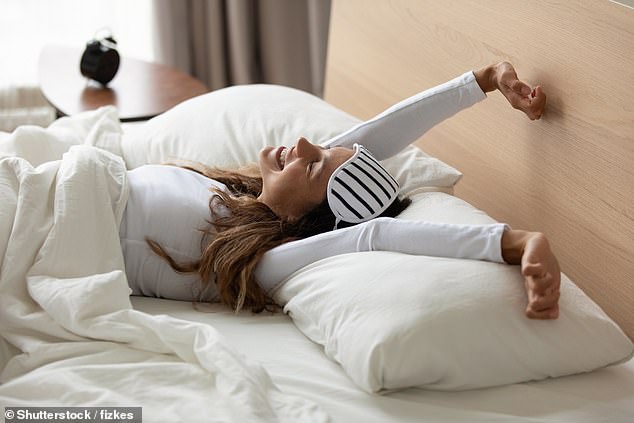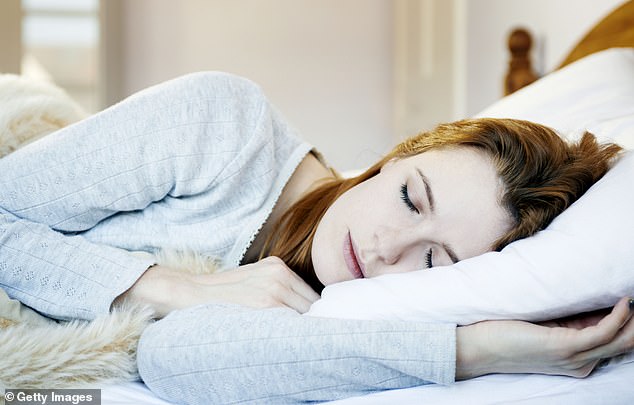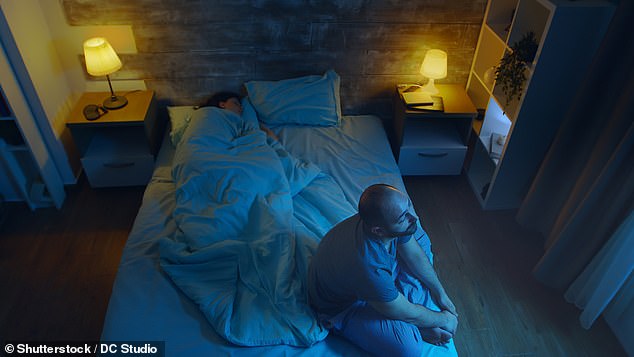One of my regrets in life is not being able to speak another language with any real fluency.
I’m embarrassed by my very basic French, but not embarrassed enough to put in the hard work to improve it. So I was delighted when I came across a recent study which suggested you can learn new words in your sleep.
Researchers from the University of Bern in Switzerland played volunteers a range of words in a language they didn’t understand, along with a translation, while they were in deep sleep.
Then, 36 hours later, they were asked to guess if a particular word meant an animal, a tool or a place. They did significantly better than a control group, who weren’t played the words — proving astonishingly that, despite being deeply asleep, they were still aware enough to learn something new.
That’s the good news. The bad news is that to produce this effect, the researchers had to use very short words, delivered at just the right moment in the volunteers’ sleep cycles, so unfortunately I am not sure this is going to help me.

A new study adds to mounting evidence that deep sleep plays a vital role in memory (file image of a woman awakening)
But this study does confirm just how much is going on in our brains while we are sleeping.
And it adds to mounting evidence that deep sleep plays a vital role in memory and may even protect us against Alzheimer’s.
Deep sleep is one of the four main stages of our sleep cycle. It’s also known as slow-wave sleep because it’s when millions of neurons in your brain start firing together, producing big waves that slowly travel through your brain.
In deep sleep you’re at your most relaxed, and difficult to rouse, but below the surface there is plenty going on.
Your pituitary gland in the brain starts to secrete more growth hormone, vital for cell growth and repair, for instance.
Deep sleep also boosts production of cytokines, a type of protein that’s key for helping fight infections, which is partly why a lack of deep sleep makes you more vulnerable to colds and also reduces the efficacy of vaccines against infections such as the flu.
And deep sleep is when a network of channels in your brain, known as the glymphatic system, opens up, allowing fluid to pour through it, washing away the toxic waste that’s built up during the day. Which in turn can protect us from the impact of diseases such as Alzheimer’s.
This was demonstrated in a fascinating new study by the University of California (UC), Berkeley, where researchers measured the brain activity of healthy adults in their 70s as they slept. The study participants also had brain scans to measure levels of amyloid, a protein linked to memory loss and dementia.

In deep sleep you’re at your most relaxed, and difficult to rouse, but below the surface there is plenty going on (file image of a woman sleeping)
The results showed that despite having high amounts of amyloid in their brain, the participants who got plenty of deep sleep did far better in memory tests than those who had less.
The researchers think deep sleep could help explain why some people, despite their brains being clogged with amyloid, continue to thrive into old age, while others develop signs of dementia.
As Matthew Walker, a professor of neuroscience at UC Berkeley and a leading sleep expert, explained: ‘Think of deep sleep almost like a life raft that keeps your memory afloat, rather than memory getting dragged down by the weight of Alzheimer’s disease.’
Adults typically get around one to two hours of deep sleep a night, but this tends to drop off as we get older.
So how can we boost it? Apart from obvious things, such as cutting back on booze and getting to bed reasonably early (typically most deep sleep occurs in the first half of the night, which may give modern credence to the old saying, every hour of sleep before midnight is worth two after), you could try cutting down on junk food and instead eat a higher fibre, Mediterranean-style diet.
Numerous studies have shown that people who follow a Mediterranean-style diet (one that is rich in nuts, olive oil, oily fish and vegetables) have better quality sleep, while those who eat junk food tend to struggle. This includes research published recently in the journal Obesity, which compared the effect on sleep of a healthy diet with one that was moderately high in ultra-processed food.
The researchers from the University of Uppsala in Sweden randomly allocated a group of healthy young men to one approach for a week, then switched over.
Although the young men slept just as long on either diet, when they were eating junk food they had shallower, less restorative deep sleep, something which would become increasingly important as we get older.

Adults typically get around one to two hours of deep sleep a night, but this tends to drop off as we get older (file image of a man awake while his partner sleeps)
Surprisingly enough, listening to sound can also make a difference. A couple of years ago I tried out a headband which measures your brain activity during sleep. As soon as the headband detects that you are in deep sleep, it makes a clicking noise that is quiet enough that it doesn’t wake you up.
For unknown reasons this clicking noise, delivered at just the right moment, helps to boost those low slow waves you get in deep sleep.
Unfortunately it didn’t do anything for me, but a study published last year by University Hospital Zurich produced more positive results.
It tested a similar device on a range of people, aged 60 to 80, and found that it did help some get more deep sleep (though others, like me, responded minimally or not at all).
The researchers are currently trying to improve its effectiveness before releasing a commercial version.
But by far the simplest thing you can do, particularly as we approach the longest day of the year, is to wear an eye mask.
Even with thick curtains you will be getting a lot of exposure to bright light first thing in the morning and last thing at night, and that will almost certainly be disrupting your sleep.
Wearing a mask works for me.
Does your face look older than your inner arm?
There’s much I love about this time of year, but the downsides include wasps, mozzies and worst of all, ultraviolet (UV) light.
I’ve recently finished making a TV series on ageing, and one of the most striking things I learned is just how much the sun ages our skin, with up to 80 per cent of facial ageing due to damage from UV light.
To see what your face would have looked like if you hadn’t been exposed to too much UV light, check out the parts of your body which don’t get lots of sun exposure, such as inside your upper arm.
Of course, prevention is better than cure: you can check the strength of the sun in your area with the UV index (just search online) — this runs from 1 to 11, but even in the 3-5 range you can still burn.

Up to 80 per cent of facial ageing is due to damage from UV light (file image of a woman applying sunscreen lotion at seaside)
Once the damage is done, the creams with the best research behind them contain retinol, a compound shown to reduce the appearance of wrinkles by increasing the elasticity and thickness of your skin. But retinol can cause skin irritation so start with a low concentration (0.1 per cent).
No one wants to become wrinkly before their time, but developing skin cancers is even worse. Although melanoma is the most feared, other forms of skin cancer, such as basal cell carcinomas (BCCs), are far more common and over the past decade the number of BCC cases has risen by 40 per cent.
My wife, Clare, is one of them: now in her early 60s, she’s recently had two removed from her face.
Although BCCs tend to appear later in life, the damage is normally done at a much earlier age. A sobering study by the University of Arizona, soon to be published in the journal Cancer Epidemiology, has found that getting sunburnt just once every two years, at any point in your life, nearly doubles your risk of a BCC. So keep an eye on that UV index.
A few years ago I became a living exhibit at the Science Museum in London, when I swallowed a tiny camera and the pictures were projected on a giant screen. Visitors to the museum could see live images from inside my stomach.
It was fantastically interesting, particularly when I ate and we were able to watch the food arrive in my stomach and slowly get digested.
At the time I thought how much better it would be if I could manoeuvre the camera for the best images. And now researchers at George Washington University in the U.S. have done just that, using magnets operated by a video game-style joystick.
I look forward to giving it a test run.
Tomorrow is Father’s Day and there’s still time to buy a card or call to let your dad know how much you love him. Sadly mine died 20 years ago, but I miss him a lot. And now I’m a father myself I can appreciate all the things he did for me. He died aged 74 from, among other things, complications of type 2 diabetes. One of my greatest sadnesses is I wasn’t able to give him the advice and support that might have kept him in good health for longer. So if your parents are still alive, cherish them.